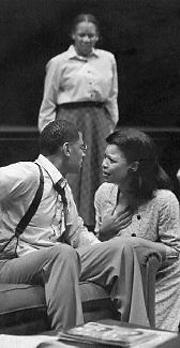Crumbs from the Table of Joy
Intiman Theater, ends July 1
UNLIKE THE UNCURABLY nostalgic narrator of your typical memory play, young Ernestine Crump (Robyne Walker, in a supremely confident debut right out of UW), the narrator of Lynn Nottage’s Crumbs from the Table of Joy, is a bit perplexed looking back at her youth, growing up poor, black, and seriously dislocated after her father leaves their home down South for the Bronx guided only by the return address on a prayer sheet from the charismatic leader Father Divine. Godfrey (Timothy Piggee) can’t get over the death of his wife, so he transports Ernestine and her sister Ermina (Lisa Estridge-Gray) to a new life. Nottage introduces such original and complex characters in the first half of her play that at the interval you’re left buzzing as to how she’ll ever resolve their fascinating conflicts; unfortunately she doesn’t, quite. Neither director Jacqueline Moscou or her fine cast are willing to concede the point, however, and their hard work means that although the play’s second half loses its narrative push, the result is still a sharp, entertaining, and refreshingly unsentimental look at a largely forgotten period in African-American history, just prior to the explosion of the Civil Rights Movement.
JOHN LONGENBAUGH
All About Medea
Re-bar, ends August 6
All About Medea repeatedly threatens to be a great piece of backstage comedy. Teeming with jealous, backbiting lovers and manipulative actors, the play tells the story of a struggling theater company and a diva who just wants some time off. While playwright Mark Mitchell made a brilliant choice in combining parodies of Medea and All About Eve, the spirit of both sources becomes muddled in a rush to make a commentary on queer theater. The play within the play is the strongest part of the show, with its over-the-top delivery of Greek tragedy given a kabuki-like affectation. The actors, in their best corsets and leather, are entirely at ease when camping it up for the audience. But the behind-the-scenes drama fails to deliver the required dagger-with-a-smile, and we never see the presence of real personality that’s required to drive the sharp patter of dialogue convincingly.
GREGORY ZURA




